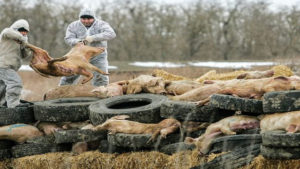 Following the news that the African Swine Fever (ASF) has been detected in the Americas, livestock farmers in Antigua and Barbuda and the rest of the region have been advised to “intensify protective measures” against the disease.
Following the news that the African Swine Fever (ASF) has been detected in the Americas, livestock farmers in Antigua and Barbuda and the rest of the region have been advised to “intensify protective measures” against the disease.
Over the weekend, the Caribbean Agricultural Health and Food Safety Agency (CAHSFA) made the announcement after discussions were held at the recently concluded 21st Annual Meeting of the Caricom Committee of Chief Veterinary Officers.
Increased border surveillance, activating or updating national disease emergency/contingency plans, intensifying surveillance and early detection mechanisms and activities, intensifying regional coordination among development partners, Revising and updating procedures to manage international garbage from ports of entry, and Improving collaboration in the area of diagnostics were among the recommendations shared to limit the spread.
African Swine Fever is a highly contagious hemorrhagic viral disease of domestic and wild pigs. It is a transboundary animal disease (TAD) that can be spread by live or dead pigs, domestic or wild, and pork products, contaminated feed and objects such as shoes, clothes, vehicles, knives, and. ASF had significantly reduced the pig population in China back in 2019 and has the potential for devastating consequences for the Caribbean.
Thus far the disease has already killed more than 800 pigs in two locations in the Dominican Republic.
